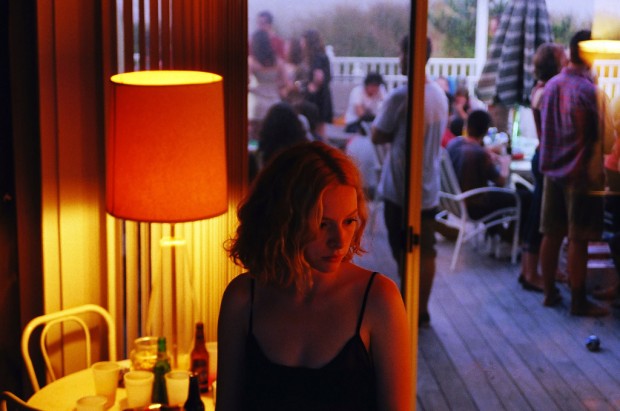There is an ease at which Matthew Porterfield‘s I Used To Be Darker moves that is at once aggravating and captivating. Telling the deceivingly simple tale of one extended family coming to terms with a bevy of personal problems, mostly through music, Darker is a very passionate piece of work that marks a large step forward for writer/director Porterfield, who has been riding the festival circuit since 2006 with his debut Hamilton.
Darker concerns Taryn (Deragh Campbell), a young Irish woman escaping a summer of trouble in Ocean City, Maryland by seeking refuge with her Aunt Kim (Kim Taylor) and Uncle Bill (Ned Oldham). Unfortunately, Kim and Bill are in the middle of splitting up after years of marriage and a daughter, named Abby (Hannah Gross), to boot.
Thankfully, these multiple elements of high drama, though they are introduced early on in the film, never dissolve into melodrama. Taking place primarily in two houses in suburban Baltimore, our characters try to communicate with each other as best they can. Most of the time this requires them to fake it and repress their true feelings. For the most part, these emotions come through in the music they play. Kim and Bill are both musicians, but where Kim is still trucking along professionally, Bill was the one to take the stable job at the stable company to pay for the stable house.

To be sure, the most notable supporting character here is the music, which pushes the film through some long-winded scenes in the second act. Both Oldham and Taylor are professional musicians, and it shows. The two strongest scenes in the film are the solo performances allotted for both, each tragic, beautiful and arresting in their own way. These scenes also serve as the most extroverted of the film, complimenting the internalized, repressed rhythm of the majority of the dialogue here.
Only once or twice does this narrative structure slip, the actors forced to deliver lines that play a bit too expositional and wooden. We can feel the creative compromise made by the filmmakers to leave these bits in because of their importance in building the plot, and it becomes a distraction. Campbell, in the de facto lead role, takes some time to unravel the Taryn character, but it is worth the wait. What initially feels like a reserved, cautious performance becomes something more complex and intriguing without ever crossing the line into something generic or cliche.
Not unlike Porterfield’s second feature Putty Hill, Darker captures an organic moment in time for a specific group of people. Their lives and problems are unremarkable, and that’s the point. We are welcomed into a world not too different from our own. That kind of creative honesty is refreshing.


